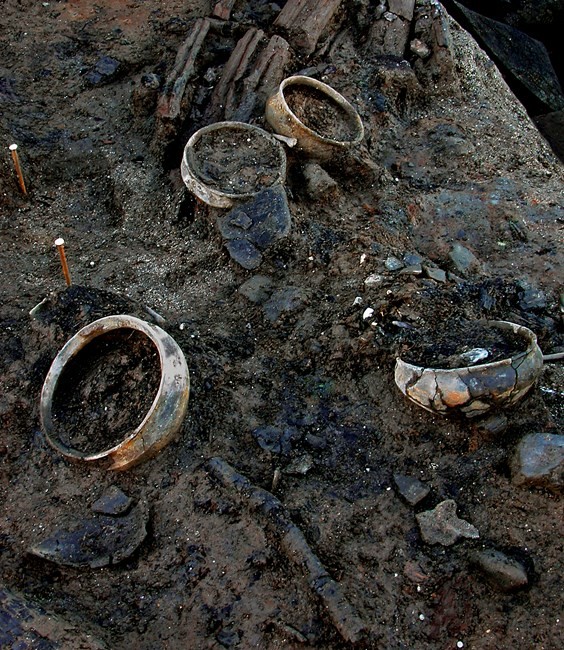By Ana Verayo, | January 13, 2016

Whole pots, fragments of textiles and other material from the timber dwelling after the structure was destroyed by fire.
Archaeologists in the U.K. uncovered amazingly well preserved Bronze Age dwellings in East Anglia, Cambridgeshire, dubbing it as Britain's "Pompeii" as scientists regarded this ancient site to be abandoned in haste by its last inhabitants.
Like Us on Facebook
This new excavation that is located in a quarry in Whittlesey is carried out by researchers from Historic England and Cambridge University, where their findings reveal a remarkable glimpse of domestic living in England, some 3,000 years ago.
This settlement dates back towards the end of the Bronze Age spanning 1,200 to 800 B.C., where this particular settlement was once home to several families living in a group of circle shaped houses that stood on stilts just above a river.
This ancient settlement was destroyed due to a fire that caused the houses to crumble apart and fall into the river, as silt and clay preserved these remnants. According to Chief Executive of Historic England, Duncan Wilson, this appears to be a frozen moment in time.
He adds how this excavation is providing new insight about what food our ancestors consumed and also the pottery they have used to cook and serve it. Scientists consider this site of international significance as this will transform how we understand this period.
One of the interesting finds of the archaeologists is an incredible time capsule of sorts, that is just buried below six feet of ground, where the river was flowing during 1,000 to 800 B.C. There were small cups, bowls, and jars still containing food inside.
The site was so well preserved that footprints are still visible from the dwellings' home owners despite waterlogged sediments.
Apart from these, archaeologists also discovered exotic glass beads that were used to be part of an intricate necklace that suggests a new sophistication that was not associated before with the British Bronze Age, according to the Cambridge Archaeological Unit's statement.
The objects that were uncovered after thousands of years indicate that these people were forced to leave their belonging behind in an abrupt manner due to the fire, however, it is still not known if this fire was due to an accident or some hostile source, forcing them out.
In the next coming months, the scientists are expecting to discover more artifacts as the excavation is now half way done from a four year project. According to David Gibson of the Cambridge Archaeological Unit, later Bronze Age sites usually involve pits, post holes and rare metal finds, but this time around, this site has been so much well preserved that everyday life during this period can be seen so clearly, deeming it as prehistoric archaeology in 3D.
-
Use of Coronavirus Pandemic Drones Raises Privacy Concerns: Drones Spread Fear, Local Officials Say

-
Coronavirus Hampers The Delivery Of Lockheed Martin F-35 Stealth Fighters For 2020

-
Instagram Speeds Up Plans to Add Account Memorialization Feature Due to COVID-19 Deaths

-
NASA: Perseverance Plans to Bring 'Mars Rock' to Earth in 2031

-
600 Dead And 3,000 In The Hospital as Iranians Believed Drinking High-Concentrations of Alcohol Can Cure The Coronavirus

-
600 Dead And 3,000 In The Hospital as Iranians Believed Drinking High-Concentrations of Alcohol Can Cure The Coronavirus

-
COVID-19: Doctors, Nurses Use Virtual Reality to Learn New Skills in Treating Coronavirus Patients







